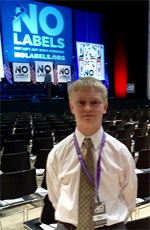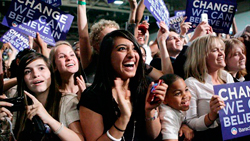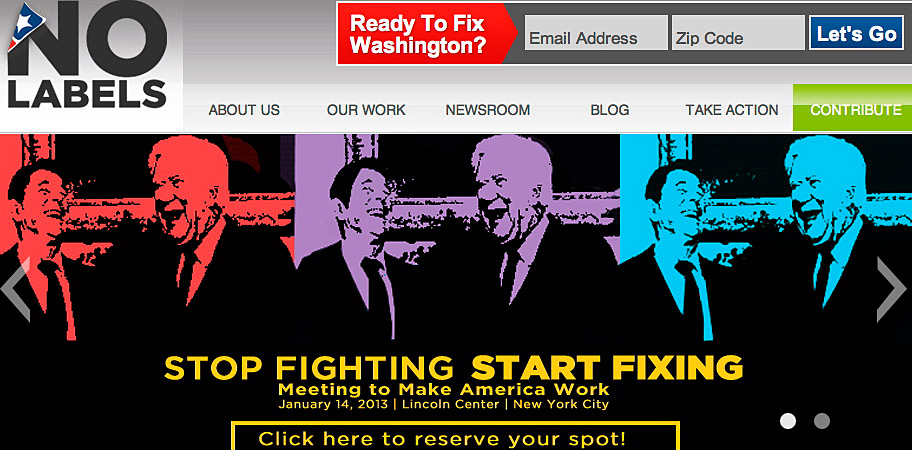See additional profiles » » DOWNLOAD PDF OF ALL 20 PROFILES » »
Hyper-partisanship and dismissing youth voice
August 9, 2012
Hyper-partisanship turns off young voters as much or more as it sours older Americans. "It's not your imagination," a recent CNN Opinion piece begins. "Our politics are more polarized than at any point in recent history."
"Here's the real wake-up call: Americans are more divided about partisan politics right now than they are about race, class, gender and age," the CNN piece continues. "That's right: Forget the original sin of slavery and the longstanding fights over civil rights -- those old divisions now seem small compared with perceptions of whether a person is a Republican or Democrat. Welcome to the new bigotry, where a person's partisan identification is a source of prejudice, seen as a reflection of fundamentally different values, representative of an alien America."
In these three profiles by Y-Press journalist, politically active teens—all trending Democratic—talk about their disillusionment with the partisanship that grips Washington They are also tired of being discounted because of their youth.
Mason Garard, 16 Indianapolis, IN
by Sigal Tavel, 16, Y-Press
Apart from his silent support of Barack Obama in 2008, Mason Garard was not involved in politics until two years ago, when his father introduced him to the group No Labels, a bipartisan organization that distributes money and votes to get more moderate candidates elected and to “break the gridlock in Washington and actually get stuff done, ” he said.
” he said.
After two years of doing research and organizing events, Mason is now the Indiana youth coordinator for No Labels as well as the founder of the No Labels club at North Central High School in Indianapolis. He also helped in the effort to re-elect U.S. Sen. Richard Lugar, at first deciding just to “drop in” to the office and eventually getting absorbed in campaign, which was unsuccessful.
In the years ahead, Mason hopes to help expand the No Labels movement, raise more money and support for the organization, and keep his grades up. He would eventually like to run for political office.
Describe the issue that you think is most pressing for our country and why.
Hyper-partisanship, I believe. I think it incorporates some of the key issues that I think are dividing the country right now, specifically gridlock and money in politics. And of course that’s not exactly helped by the fact that now we have these super-PACs that just donate unlimited amounts of money to a campaign cause and make these situations just worse because nobody has the power to oppose them now.
If you could pass any piece of legislation, what issue would it be about and what would you be trying to change?
If I had to pass any piece of legislation, it would be the current bill that’s in the House right now, the “No budget, no pay” bill. That’s actually a bill that No Labels supported and came up with as part of their 12 points to make Congress work, and it’s basically what it says: If Congress does not pass a budget, then there’s no pay, then the Congressmen don’t get paid. Do you know we have not passed a successfully balanced budget in 40 years? It’s all because the conservatives won’t like compromise on defense spending and the liberals won’t compromise on Social Security.
According to researchers, youth voter turnout increased from 2004 to 2008; however, fewer youth are expected to turn out for this year’s election. Why do you think that is?
I think that from what I’ve seen at North Central [High School], people have become more disillusioned with the government. I think that it all leads back to the conflict in Washington. Lack of compromise leads to lack of anything getting done. Lack of anything getting done leads to a negative view of politicians. And a negative view of the politicians by the youth leads to lack of voter turnout. I think it’s as simple as that.
Ratnajyothi Patel, 16 Richmond, VA
by Shanze Tahir, 15 Y-Press
A Ratnajyothi Patel has been a long-time supporter of Barack Obama, volunteering for both of his presidential campaigns. Though her family is in the middle of moving, she continues to make phone calls and go door-to-door on behalf of the president.
 Ratnajyothi says she was inspired to volunteer to clear up some misinformation about Mr. Obama.
“I felt that the media kept skewing his point of view and people were getting either biased information or information that was just plain misleading,” she said. She believes that he has done a great job as president and hopes to see him win again this year.
Ratnajyothi says she was inspired to volunteer to clear up some misinformation about Mr. Obama.
“I felt that the media kept skewing his point of view and people were getting either biased information or information that was just plain misleading,” she said. She believes that he has done a great job as president and hopes to see him win again this year.
Describe the issue you think is most pressing for our country. Why?
I think that each issue weighs equally on the country such as immigration, civil rights, health care—you name it. Right now, I think the most important thing that we as a country need to tackle is the divide between parties. They are so focused on party loyalty. Both Democrats and Republicans are guilty of this. I think that instead of relying on party loyalty, we need to shut up and focus on how we are going to fix the deficit and create jobs. Both parties need to settle their differences, learn to act like adults, and compromise. According to researchers, youth voter turnout increased from 2004 to 2008; however, fewer youth are expected to turn out for this year’s election.
Why do you think that is?
I think that young people are tired. They’re tired of not being taken seriously. They’re tired of political parties and candidates who don’t care about them. They’re tired of trying to get involved, and they’re just not willing to try anymore. Granted, there are a lot of youth who do still care, but a lot of people I know just are sick and tired of being written off.
What advice would you give to other kids who want to get politically involved?
They need to ignore the “you’re too young” attitude and go stand up for what they believe in. They need to show the world that they are worth listening to. This “you’re too young” attitude will be around forever unless we show the world that we are worth listening to. In the end, we have to show adults that we are not too young.
Ian Kea, 17 Indianapolis, IN
by Max Gabovitch, 19 Y-Press
Ian Kea says he has always been involved in politics. After joining his high school’s Young Democrats club as a freshman, he set his sights on the Indiana High School Democrats as a junior. This year, he is vice press.jpg) ident of the organization.
ident of the organization.
Ian says that when he joined, Indiana High School Democrats was almost dead, but he worked hard with other members of the executive committee to revive the organization, which now has 23 participating chapters. Their hard work paid off in another way: The Indiana chapter won the High School Democrats of America’s “most developed chapter” award.
How would you describe Indiana High School Democrats?
Indiana High School Democrats does a lot of things. The big thing is expansion right now. We encourage all high schools in Indiana to have a Young Democrats club. Also, our big thing is endorsing candidates in the primaries. Recently, we endorsed Shelli Yoder in the 9th congressional district, and she won her primary and now she is the candidate for the 9th district. Our other big thing is organizing rallies and events. We helped with some LGBT events and we also helped with some political events as well.
Why a Democrat?
The morals and values of the Democratic Party inspire me to help with the organization and to help spread it. The Democratic Party serves the middle class, they help the majority of the population. The party itself supports working families and supports equal rights and supports health care. I feel very strongly about those rights, and that’s why I continue to push on with this organization.
Do you plan to change your activities as the election gets closer?
Our big thing is working with Obama for America to register voters. Statistics have shown recently that there are a lot of Democrats out there, but a lot of them don’t sign up to vote. So, what we’re trying to do is get our members and our executive committee to get out there and just go door-to-door and get people registered. We’re just really trying to go grassroots here and go to the people, not just put stuff out on Facebook and Twitter.
How frustrating is it for you to see people who are eligible to vote not exercise that right?
Unfortunately, it’s very frustrating. I hope people realize that people in other countries fight for the right to vote and die for the right to vote. In the American Revolution and the War of 1812, people died for the right to vote. Some people just don’t understand the power of voting. They say that one vote won’t matter, but if you have one voter come and then another voter come and another voter come, that’s three votes, you know. It adds up.
See additional profiles » » DOWNLOAD PDF OF ALL 20 PROFILES » »
To get a youth perspective on the 2012 Presidential Elections, WKCD has teamed up with the youth-led news bureau, Y-Press, based in Indianapolis. Originally part of the Children’s Express, Y-Press has nurtured young journalists for more than 20 years. Their stories and articles—on local, national, and global topics—appear every other week in the Indianapolis Star. The Y-Press web site is updated regularly and encourages external submissions and comments about youth-written stories and reviews.
Here, Y-Press reporters will be posting: stories about the campaign, the candidates, and youth perspectives on the political process profiles and interviews with young political activists results from surveys they’ve created to gather information from youth nationwide about the candidates and the issues most important to young people reports from the floor at both of this summer’s national conventions. Check back often to keep up with this special “youth beat” on Election 2012.





